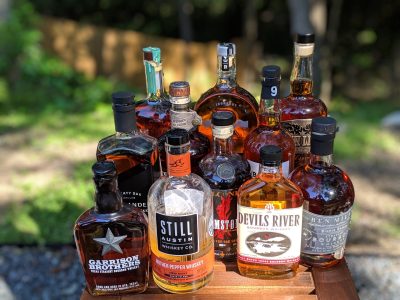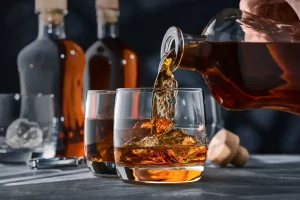Are you a fan of bourbon or scotch? These two classic types of whisky are similar yet different in many ways. Both bourbon and scotch are made from grains and aged in oak barrels, but the specific grains and aging process differ.
Bourbon is made from at least 51% corn and aged in new charred oak barrels, while scotch is made from malted barley and aged in used oak barrels. Bourbon is known for its sweet, smooth flavor, while scotch tends to have a bolder, peatier taste.
So, which one is right for you? Join us as we explore bourbon vs scotch and help you decide which one to enjoy on your next night in.
What is the difference between bourbon and scotch?
Bourbon and scotch are both types of whisky, but there are a few key differences that set them apart.
Here are some key points to consider when trying to decide between the two:
1. Ingredients: Bourbon is made from at least 51% corn, while scotch is made from malted barley.
2. Aging process: Bourbon is aged in new charred oak barrels, while scotch is aged in used oak barrels. This can give scotch a more complex, layered flavor.
3. Flavor profile: Bourbon is known for its sweet, smooth flavor, while scotch tends to have a bolder, peatier taste.
4. Production location: Bourbon can only be made in the United States, while scotch must be made in Scotland.
5. Ultimately, the choice between bourbon and scotch comes down to personal preference. Both are delicious in their own way and have unique flavors that make them stand out.
How is bourbon made vs scotch?
Bourbon and scotch are both types of whisky, but they are made using different ingredients and processes. Here’s a breakdown of how each is made:
Bourbon:
- Bourbon is made from a mixture of grains, with at least 51% being corn. The other grains used can include wheat, rye, and malted barley.
- The grains are ground into a meal and mixed with water to create a mash.
- The mash is then fermented using yeast to convert the sugars into alcohol.
- The fermented liquid, called “distiller’s beer,” is then distilled to increase the alcohol content.
- The distilled liquid is then aged in new charred oak barrels for at least two years.
- After aging, the bourbon is bottled and sold.
Scotch:
- Scotch is made from malted barley and other grains such as corn, wheat, and rye.
- The grains are ground into a meal and mixed with water to create a mash.
- The mash is then fermented using yeast to convert the sugars into alcohol.
- The fermented liquid, called “wash,” is then distilled to increase the alcohol content.
- The distilled liquid is then aged in used oak barrels for at least three years.
- After aging, the scotch is bottled and sold.
As you can see, the main difference between the two is the type of grains used and the type of barrels used for aging. These factors contribute to the unique flavors of bourbon and scotch.
What are the main flavor profiles of bourbon and scotch?
Bourbon is known for its sweet, smooth flavor, which is often described as having notes of caramel, vanilla, and oak. This flavor profile is due in part to the use of corn as the main ingredient and the aging process in new charred oak barrels.
Scotch, on the other hand, tends to have a bolder, peatier flavor profile. The use of malted barley as the main ingredient and the aging process in used oak barrels contribute to the complex, layered flavors of scotch. Common tasting notes for scotch include smoky, peaty, and woody flavors.
Ultimately, the flavor profile of a particular bourbon or scotch will depend on the specific brand and recipe used. Some may be sweeter or smoky, while others may be more balanced or have a more subtle flavor.
How long do bourbon and scotch need to be aged?
Bourbon and Scotch are both types of whisky that are aged in oak barrels. The length of time they are aged can vary significantly, but in general, bourbon must be aged for at least two years, while Scotch must be aged for at least three years.
Bourbon that has been aged for at least four years can be labeled as “aged” or “aged for x years,” while bourbon that has been aged for at least four years and bottled at a minimum of 50% ABV (alcohol by volume) can be labeled as “straight bourbon.”
Scotch whisky can be aged for much longer than bourbon, with some expressions being aged for 10, 15, 20 years or more. The age of a Scotch whisky is often reflected in its price, with older expressions tending to be more expensive.
However, it’s important to note that age is not the only factor that determines the quality of a whisky. Other factors, such as the type of barrel used for aging, the source of the water and barley, and the production methods, can also have a significant impact on the final product.
What are the best bourbon brands compared to scotch?
It is difficult to say which are the “best” brands of bourbon and Scotch, as personal preferences for whisky can vary greatly.
Some people may prefer the bold, spicy flavors of a rye-heavy bourbon, while others may prefer the softer, sweeter notes of a wheat bourbon. Similarly, some people may enjoy the smoky, peaty flavors of a single malt Scotch, while others may prefer the smooth, easy-drinking character of a blended Scotch.
That being said, some popular bourbon brands include:
- Maker’s Mark
- Jim Beam
- Wild Turkey
- Bulleit
- Evan Williams
- Woodford Reserve
- Four Roses
- Knob Creek
- Old Forester
Some popular Scotch brands include:
- Johnnie Walker
- Chivas Regal
- Glenfiddich
- Macallan
- Laphroaig
- Glenlivet
- Talisker
- The Glenrothes
- Ardbeg
It’s worth trying a few different brands and expressions to find the ones that best suit your personal taste. Many liquor stores and bars offer tasting flights or small pours, which can be a great way to explore different whiskies without committing to a full bottle.
How much do bourbon and scotch cost?
The cost of bourbon and Scotch can vary widely depending on a number of factors, including the age of the whisky, the brand, the rarity of the expression, and the demand for it.
In general, you can expect to pay anywhere from $20 to $100 or more for a bottle of bourbon, with the average price falling somewhere around $30 to $50. For example, a bottle of Jim Beam bourbon may cost around $20, while a bottle of Pappy Van Winkle’s Family Reserve, a highly sought-after and rare bourbon, can fetch prices of several hundred dollars or more.
The cost of Scotch can also range from $20 to $100 or more per bottle, with the average price falling in the $30 to $50 range. Single malt Scotch tends to be more expensive than blended Scotch, as it is made from 100% malted barley and is often aged for longer periods of time.
For example, a bottle of Johnnie Walker Red Label blended. Scotch may cost around $25, while a bottle of Glenfiddich single malt Scotch aged for 12 years may cost around $45.
It’s worth noting that these prices can vary based on location and availability, and you may be able to find discounts or special deals at certain stores or online.
Can bourbon and scotch be mixed together in cocktails?
Yes, bourbon and Scotch can be mixed together in cocktails. In fact, many classic cocktails, such as the Manhattan, the Old Fashioned, and the Rob Roy feature a combination of bourbon or Scotch as the base spirit.
Bourbon and Scotch have different flavor profiles, with bourbon tending to be sweeter and smoother and Scotch being more complex and often smoky or peaty. When mixed together in a cocktail, these flavors can complement each other and create a well-balanced drink.
Here are a few examples of cocktails that feature a combination of bourbon and Scotch:
- The Rusty Nail: a mix of Scotch and Drambuie (a Scotch-based liqueur) served over ice
- The Godfather: a mix of Scotch and amaretto served over ice
- The Penicillin: a mix of Scotch, lemon juice, honey syrup, and ginger liqueur served over ice and garnished with a candied ginger slice.
It’s worth noting that the proportions of bourbon and Scotch used in these cocktails can vary, and you may need to adjust the ratios to suit your personal taste. Experimenting with different combinations and ratios can be a fun way to discover new flavors and find a cocktail that you enjoy.
What are the best food pairings for bourbon and scotch?
Bourbon and Scotch are both versatile spirits that can be paired with a wide range of foods. Here are a few ideas for food pairings for both bourbon and Scotch:
Bourbon
Bourbon pairs well with rich, savory foods such as grilled meats, roasted vegetables, and hearty stews. It can also be paired with sweet desserts such as chocolate cake or pecan pie.
Some specific food pairings to try with bourbon include:
- Grilled steak with a bourbon-based marinade
- Bourbon-glazed pork chops
- Bourbon pecan pie
- Bourbon-soaked cherries over vanilla ice cream
Scotch
Scotch pairs well with robust, flavorful foods such as cured meats, strong cheeses, and grilled seafood. It can also be paired with sweet desserts such as dark chocolate or fruit tarts.
Some specific food pairings to try with Scotch include:
- Grilled salmon with a Scotch-based glaze
- Scotch and cheddar cheese fondue
- Dark chocolate truffles with a splash of Scotch
- Grilled figs with a Scotch-based sauce
It is important you know that these are just a few examples, and there are many other combinations you can try. The key is to find flavors that complement or contrast with the flavors of the whisky you’re serving. Experimenting with different pairings can be a fun way to discover new flavor combinations and find the ones that work best for you.
What are the health benefits of bourbon and scotch?
It’s important to note that consuming alcohol, including bourbon and Scotch, can have negative health effects if consumed in excess.
The Centers for Disease Control and Prevention (CDC) recommends that men and women should limit their alcohol intake to no more than one drink per day for women and two drinks per day for men.
With that being said, some studies have suggested that moderate consumption of alcohol, including bourbon and Scotch, may have some potential health benefits.
Here are a few examples:
1. Cardiovascular health
Moderate alcohol consumption, including bourbon and Scotch, may help to reduce the risk of heart disease by increasing levels of “good” cholesterol (HDL) and decreasing the risk of blood clot formation.
2. Cognitive function
Some studies have suggested that moderate alcohol consumption may help to reduce the risk of cognitive decline and dementia.
3. Diabetes
Moderate alcohol consumption may help to reduce the risk of type 2 diabetes by increasing insulin sensitivity.
In addition, these potential health benefits are based on moderate consumption, and the negative health effects of excessive alcohol consumption far outweigh any potential benefits.
It’s also important to note that the effects of alcohol can vary from person to person, and it’s always a good idea to consult with a healthcare professional before making any changes to your diet or alcohol consumption habits.
How is bourbon and scotch traditionally served?
Bourbon and Scotch are both traditionally served neat, which means that they are served at room temperature, without any ice or mixers. Some people may also choose to add a small amount of water to their whisky to help release the flavors and aromas.
Bourbon and Scotch can also be served on the rocks, which means that they are served over ice. This can help to mellow out the flavors of the whisky and make it more refreshing on a hot day.
In addition to being served neat or on the rocks, bourbon and Scotch can also be used as the base spirit in cocktails. Some popular cocktails that feature bourbon or Scotch include the Old Fashioned, the Manhattan, the Rob Roy, and the Rusty Nail.
It’s worth noting that personal preferences for how to serve whisky can vary, and some people may prefer their bourbon or Scotch served in a different way. Experimenting with different serving styles can be a fun way to discover new ways to enjoy these spirits.
Can bourbon and scotch be used in cooking and baking?
Yes, bourbon and Scotch can be used in cooking and baking to add flavor and depth to a wide range of dishes. Both bourbon and Scotch have complex, rich flavors that can complement a variety of ingredients, making them versatile ingredients in the kitchen.
Bourbon and Scotch can be used to marinate meats, add depth to sauces and stews, and enhance the flavor of desserts such as cakes, pies, and ice cream. They can also be used to make glazes and reductions for vegetables, poultry, and seafood.
Here are a few examples of dishes that feature bourbon or Scotch as an ingredient:
- Bourbon-glazed ham
- Bourbon-marinated steak
- Bourbon pecan pie
- Bourbon-soaked cherries over vanilla ice cream
- Scotch eggs
- Grilled salmon with a Scotch glaze
- Scotch and cheddar cheese fondue
When using bourbon or Scotch in cooking and baking, it’s important to remember that the alcohol content will cook off over time, leaving behind the flavors of the whisky. You may need to adjust the number of other ingredients in your recipe to account for the loss of volume.
It’s also worth noting that the flavors of bourbon and Scotch can vary significantly, so it’s a good idea to choose a brand that you enjoy drinking on its own. This will help to ensure that the finished dish has a balanced, pleasant flavor.
What are the cultural and historical differences between bourbon and scotch?
Bourbon and Scotch are both types of whisky that have a rich cultural and historical heritage. Here are a few key differences between the two:
Production methods
Bourbon and Scotch are made using different production methods, which can result in differences in flavor and character. Bourbon is made from a mash of at least 51% corn, while Scotch is made from malted barley.
Bourbon is also aged in new, charred oak barrels, which can contribute flavors of vanilla, caramel, and spice to the final product. Scotch, on the other hand, is aged in used barrels that have previously held bourbon or Sherry, which can impart different flavors to the whisky.
Geographical origin
Bourbon is a type of American whiskey that can only be produced in the United States, while Scotch is a type of whisky that must be produced in Scotland.
Aging requirements
Bourbon must be aged for at least two years, while Scotch must be aged for at least three years. Some expressions of Scotch are aged for much longer, with some being aged for 10, 15, 20 years, or more.
Flavor profile
Bourbon tends to have a sweeter, smoother flavor profile due to the high corn content and the use of new oak barrels. Scotch, on the other hand, tends to have a more complex flavor profile that can range from smoky and peaty to fruity and floral, depending on the type of whisky and the production methods used.
These are just a few of the key differences between bourbon and Scotch. Both are highly respected and enjoyed spirits with a rich cultural and historical heritage, and they continue to be popular choices for whisky lovers around the world.
Recommended:
- How many shots of whiskey to get drunk?
- How many shots in a bottle of whiskey?
- How much alcohol is in modelo?
Can scotch be aged for less time than bourbon?
Yes, Scotch can be aged for less time than bourbon. According to the Scotch Whisky Association, Scotch must be aged for at least three years in oak barrels before it can be called “Scotch.” However, many expressions of Scotch are aged for much longer than three years, with some being aged for 10, 15, 20 years, or more.
In contrast, bourbon must be aged for at least two years before it can be called “bourbon.” Some expressions of bourbon are aged for much longer than two years, and the age of the whisky is often reflected in the price, with older expressions tending to be more expensive.
It’s worth noting that the age of a whisky is not the only factor that determines its quality. Other factors, such as the type of barrel used for aging, the source of the water and barley, and the production methods, can also have a significant impact on the final product.
Conclusion
Bourbon vs Scotch are both types of whisky with a rich cultural and historical heritage. They are both made from grains and aged in oak barrels, but there are some key differences between the two.
Bourbon is a type of American whiskey that must be made from at least 51% corn and aged for at least two years in new, charred oak barrels. Scotch, on the other hand, is a type of whisky that must be produced in Scotland and aged for at least three years in oak barrels that have previously held bourbon or Sherry.




